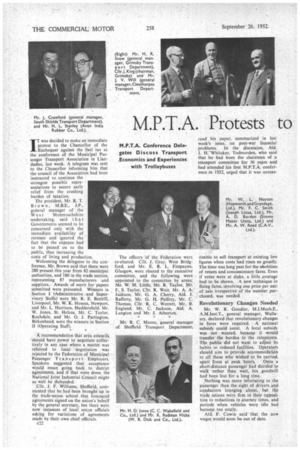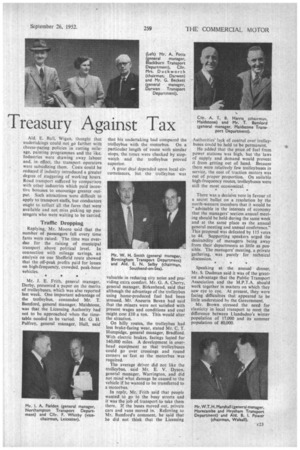Vi.P.T.A. Protests to
Page 88

Page 89

If you've noticed an error in this article please click here to report it so we can fix it.
Treasury Against Tax
M.P.T.A. Conference Delegates Discuss Transport Economics and Experiences with Trolleybuses
IT was decided to make an immediate protest to the Chancellor of the Exchequer against the fuel tax at the conference of the Municipal Passenger Transport Association in Llandudno, last week. A telegram was sent to the Chancellor informing him that the council of the Association had been instructed to continue the strongest possible representations to secure early
relief from the crushing burden of taxation.
The president. Mr. R. T. B r ow n, M.B.E.. J.P., general manager of the West Monmouthshire undertaking, said t h a t Governments seemed to be concerned only with the immediate availability of revenue and ignored the fact that the expense had to be passed on to the public, thus increasing the costs of living and production.
Welcoming the delegates to the conference, Mr. Brown said that there were . 280 present this year from 82 municipal authorities, and'180 in the trade section, representing 87 manufacturers and suppliers. • Awards of merit for papers submitted were presented. Winners in Section I (Administrative and Supervisory Staffs) were Mr. R. E. Bottritl, Liverpool, Mr. W, K. Honess, Newport, and Mr. L. Harrison, Huddersfield. Mr. W. Jones, St. Helens, Mr, C. Taylor, Rochdale, and Mr. 0. J. Partington, Birkenhead, were the winners in Section II (Operating Staff).
A recommendation that area councils, should have .power to negotiate collectively in any case where a matter was referred to local negotiation was rejected by the Federation of Municipal Passenger T r an sp or t Employers_ Speakers. suggested that acceptance would mean going back to 'district agreements, and if that were done, the National Joint Industrial Council might as. well be disbanded.
.Cllr. J. F. Williams, Sheffield, coinmented that he hailbeen brought up in the trade-union school that honoured agreements signed on the union's behalf by the general secretary, but there were now instances of local. union. officials asking for variations of agreements made by their own chief officials.
c22
The officers -of the Federation were re-elected. Cllr. J. Gray, West Bridgford, and Mr. E. R. L. Fitzpayne, Glasgow, were elected to the executive committee, and the following were appointed to the committee by areas: Mr. W. M. Little, Mr. R. Taylor, Mr. F. S. Taylor, CUT.. R. Weir, Mr. A. A. Jackson, Mr. G. A. Cherry, Aid. J. Rafferty, Mr. G. FL. Pulfrey, Mr. C. Thomas, Dlr. R. C. Werrett, Mr. B. England, Mr. C. Jackson, Aid, A. Langton and Mr. J. Atherton. read his paper, summarized in last week's issue, on post-war financial problems. in the discussion, Ald. J. H.—Whitaker, Todmorden, who said that he had been the chairman of a transport committee for 30 years and had attended his first M.P.T.A. conference in 1922, urged that it was unreas
onable to sell transport at existing low figures when costs had risen so greatly. The time was long past for the abolition of return and concessionary fares. Even if votes were at stake, a little _courage had to be shown. A new technique in fixing fares, involving one price per unit of sale irrespective of the number purchased, was needed.
Revolutionary Changes Needed Mr. W. R. Goodier, M.T.Mech.E., A.M.Inst.T., general manager, Wallasey, declared that revolutionary changes in fares were required. A national subsidy could assist. A local subsidy was not wanted, because it would transfer the burden to the ratepayers. The public did not want to adjust its habits to reduced facilities. Operators should aim to provide accommodation to all those who wished to be carried, apart from at peak hours. Once a short-distance passenger had decided to walk rather than wait, his goodwill bad been lost for a long time.
Nothing was more infuriating to the passenger than the sight of drivers and conductors lounging about, but the trad,e unions were firm in their opposition to reductions in journey times, and periods when vehicles were idle had become too costly.
Ald. F. Cowin said that the new wages would soon be out of date. Aid. E. Ball, Wigan, thought that undertakings could not go farther with cheese-paring policies in cutting mileage, painting programmes and the iike. Industries were drawing away labour and, in effect, the transport operators were subsidizing them. Costs could be reduced if industry introduced a greater degree of staggering of working hours. Road transport suffered by comparison with other industries which paid incentive bonuses to encourage greater output. Such attractions were difficult to apply to transport staffs, but conductors ought to collect all the fares that were available and not miss picking up passengers who were waiting to be carried.
Traffic Dropping
Replying, Mr. Moore said that the number of passengers fell every time fares were raised. The time was overdue for the raising of municipal transport above political level. In connection with mileage savings, an analysis on one Sheffield route showed that the off-peak profits paid for losses on high-frequency, crowded, peak-hour vehicles.
Mr. J. E. Frith, general manager. Derby, presented a paper on the merits of trolleybuses, which was also reported last week. One important advantage of the trolleybus, contended Mr. T. Bamford, general manager, Maidstone, was that the Licensing Authority had not to be approached when the timetable needed to be varied. Mr. G. H. Pulfrey, general manager, Hull, said that his undertaking had compared the trolleybus with the motorbus. On a particular length of route with similar stops, the times were checked by stopwatch and the trolleybus proved superior.
A great deal depended upon local circumstances, but the trolleybus was valuable in reducing city noise and providing extra comfort. Mr. G. A. Cherry, general manager, Birkenhead, said that although the advantage of the trolleybus using home-produced fuel had been stressed, Mr. Aneurin Bevan had said that the miners were not satisfied with present •wages and conditions and coal might cost £10 a ton. This would alter the situation.
On hilly routes, the trolleybus had less brake-facing wear, stated Mr. C. T. Humpidge, general manager, Bradford. With electric brakes, facings lasted for 140,000 miles. A development in overhead equipment so that trolleybuses could go over crossings and round corners as fast as the motorbus was required.
The average driver did not like the trolleybus, said Mr. E. V. Dyson, general manager. Warrington, and did not mind what damage be caused to the vehicle if he wanted to be transferred to a motorbus.
In reply, Mr. Frith said that people wanted to go to the busy streets and it was the job of transport to take them there. If the buses moved out, private cars and vans moved in. Referring to Mr. Bamford's comment, he said that he did not think that the Licensing Authorities' lack of control over trolleybuses could be held to be permanent.
He added that the price of fuel from power stations was high, but the laws of supply and demand would prevent it from getting out of hand. Because there were relatively few trolleybuses in Service, the cost of traction motors was but of proper proportion. On suitable high-frequency routes, trolleybuses were still the most economical.
There was a decisive vole in favour of a secret ballot on a resolution by the north-western members that it would be " advisable in the interests of economy that the managers' section annual meeting should be held during the same week and at the same place as the annual general meeting and annual conference." This proposal was defeated by 115 votes to 44. Supporting speakers urged the desirability of managers being away from their departments as little as possible. The managers' meeting, a private gathering, was purely for technical discussion.
Speaking at the annual dinner, Mr. S. Dudman said it was of the greatest advantage that the Public Transport Association and the M.P.T.A. should work together in matters on which they saw eye to eye. At present, they were facing difficulties that appeared to be little understood by the Government.
Mr. Brown stressed the need for elasticity in local transport to meet the difference between Llandudno's winter population of 17,000 and its summer population of 80,000.




































































































































































































































































































